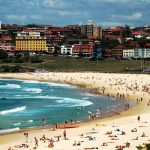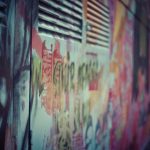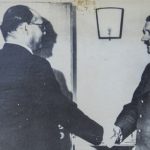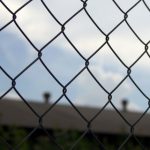Islamophobia: An Interview with AFIC President Keysar Trad
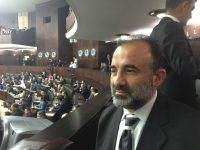
Practising Muslims pray five times a day. It’s one of the five pillars of Islam, referred to as Salat.
When they do so they kneel down and prostrate themselves, resting on a small mat and facing in the direction of Mecca: the holy city of Islam.
There were an estimated 1.7 billion Muslims around the globe in 2015, or around 23 percent of the world’s population. The majority perform this act of prayer daily.
And contrary to claims by the far-right that “Australia is in danger of being swamped by Muslims”, there were an estimated 476,000 Muslims in Australia at the last census, or just 2.2 percent of the nation’s population. Many of these people also pray in this manner every day.
Whether it’s at the Jama Masjid in Delhi, the Kowloon Mosque in Hong Kong or locally at the North Sydney Mosque, if you turn up at the right time of day, you’ll find devotees praying. It’s nothing unusual. In fact, it’s commonplace.
Praying equates radicalisation?
Channel Seven News presented some exclusive footage filmed at Goulburn Supermax Prison last week. The presenter declared that they were about to show radicalised Muslim inmates “openly practising the extreme beliefs that saw them gaoled.”
The program then cut to a clip reportedly evidencing this. The bombshell showed a group of about 20 inmates praying in the usual manner in an exercise yard.
Sure, these men are detained in the state’s toughest prison, and some have committed terrible crimes. But in the eyes of the informed, to say that praying in the usual manner is somehow proof they’re harbouring extremist sentiments is incorrect and irresponsible.
Indeed, such reporting does little more than fuel the flames of Islamophobia in this country.
Rising anti-Muslim sentiment
While sensationalist reporting about Muslims may achieve ratings, it is propagating anti-Muslim sentiment amongst the populace.
A 2016 University of South Australia study found that one in ten Australians are “highly Islamophobic.” While a 2015 study found Sydney Muslims are three times as likely to experience discrimination, than other Australians.
The vast majority of Muslims are law-abiding citizens. But if you believe the Channel Seven report, any Muslim who is found praying must be a radical.
The terrorist threat in Australia
Much of the Islamophobic media portrayals are linked to the threat of terrorism.
But as professor Greg Austin, from the UNSW Australian Centre for Cyber Security, pointed out in the Conversation, Australians are far more likely to be killed by a police officer or in a domestic violence incident, than a terrorist attack.
In this country, only three Australians over the last two decades have been killed in acts that could resemble terrorism.
Two people were killed during the tragic 2014 Martin Place siege, which was perpetrated by Man Monis, a person with no links to any terrorist organisation. Police made it clear that the act was not one of terrorism, but a heinous crime undertaken by a man with mental health issues. Another act was the killing of NSW police accountant Curtis Cheng by a 15 year-old-boy, who claimed allegiance to Islamic State.
Yet non-Muslim Australians are influenced to be fearful of Muslims, and to quickly assume that heinous crimes committed in public must be the work of Islamic terrorists. A recent example of this was the Bourke Street massacre, which was immediately reported as an act of Islamic terrorism when it was nothing of the sort.
Sydney Criminal Lawyers® spoke with Keysar Trad, president of the Australian Federation of Islamic Councils, about the rise of Islamophobia, the media propagation of it, and that controversial conversation he had on the Bolt Report last month.
Firstly, there was a report on Channel Seven News last week that showed Muslim men who were imprisoned in the Goulburn Supermax facility due to terrorist convictions.
The presenter said that the footage would show these men still “openly practising the extreme beliefs that saw them gaoled.” Then to prove this point they showed the inmates praying in the prison yard.
Mr Trad, in your opinion, is the practice of Muslim prayer proof that a person is holding radicalised beliefs?
On the contrary, the practice of Muslim prayer shows that a person is trying to bring peace into his life.
I pray five times a day. I pray in the open. Prayer makes me feel better about myself. It makes me feel that that I’m building a better connection with my creator. And as a result, I’m more conscious and more aware that God can see my actions and can hear my words. And that I’m accountable for everything that I do.
What that means is that prayer makes me watch out to make sure that I’m a good law-abiding citizen. That I’m not hurting anybody. That anytime I make a mistake and do something wrong, then I quickly try to make amends for it. I try to seek forgiveness and makes amends.
That’s what prayer does it reinforces that connection with God and that consciousness of God, and reinforces it upon me to improve myself and become a better person.
So why do you think this media report was putting those two things together: prayer and radicalised Islam?
Some sections of the media do that because they think this is what their viewers believe. And making such a negative correlation in relation to prayer is, in itself, propagating further Islamophobia.
You wouldn’t make that correlation with respect to Christian prayer. You wouldn’t say that just because a person is at mass, at Church, just because they’re there that this person is radicalised. You would never even think of suggesting something like that.
Why would you do it when it comes to Islam? It’s done because there is a clear situation of Islamophobia, or pandering to Islamophobia.
And do you think the Australian media has a tendency to fuel the flames of Islamophobia?
Sections of the media. Not all the media. I wouldn’t say all the Australian media, but sections of the media certainly do that regularly. The tabloid sections. This is the sort of popular type of journalism that relies less on tact and more on myths and perceptions.
You’ve been a critic of parts of the media for some years now. In the wake of the Cronulla Riots in 2005, you took Harbour Radio to court for alleged defamation over a broadcast on radio station 2GB.
Can you tell us a little about what actually was said on the radio? And what the outcome of the case was?
What happened, after the Cronulla Riots, I was invited by a group of students to speak at a peace rally on the Sunday after the riot.
In that speech – which I managed eventually to get a video of – I put the blame on the racist policies of the Howard government and also on tabloid journalism that perpetuates fear and misunderstanding amongst people.
So with that, I didn’t mention any specific section of tabloid journalism. But the crowd were yelling out, “2GB. What about 2GB?” I said, “There is one radio station.” But I didn’t say which station.
That day I also spoke at a peace picnic afterwards, and I went and spoke at the Carols in the Park in Sutherland, to try and promote understanding and put that racism behind us.
Basically, when I talk about tabloid journalism, it is to say to people, in a sense, don’t let it affect the way you deal with your friends, neighbours, colleagues and other sections of the society. Don’t let it do that.
Because a key point of the Cronulla riots is that it turned citizens against each other. It turns ordinary Australians against other ordinary Australians. On the basis of ethnicity.
According to the police, the people who were involved in the violence from the Shire did not have criminal records. So that adds to the concerns for me that ordinary citizens, who had clean records, were incited to violence, because they were made to hate fellow citizens on the basis of ethnic background.
And maybe to some extent religious identity.
Naturally, I had to raise that point.
Now the next day, I was attacked very savagely by Jason Morrison, who was filling in for Ray Hadley. And he said that I had exposed his reporter to danger. He explained that I was pointing at his reporter and saying, “These people are responsible.” And he explained that his reporter had to withdraw for his safety.
He, or somebody else at 2GB, tampered with the recording, so that it had static noise. And he apologised for the quality of the recording, because it had to be made from a distance.
Now I contacted the radio station. I had a meeting with their chief operating officer and she said to me at the time that Jason Morrison stands by what he said. That he had seen a video of the event. And in his spiel on the radio he said that he slow-mowed through it and checked the sound.
I worked very hard to find someone who would give me a copy. When I obtained a copy it showed very clearly that I never at any point pointed at their reporter and that the reporter did not withdraw. The reporter was holding the 2GB microphone in front of me until the very end of my speech.
Instead of stirring the crowd, I actually got the crowd to hug each other. And I did say, “Just to show the racists, let everybody embrace the person next to them and show them that the more they want to create hate amongst us, the more we are going to show love.”
Notwithstanding that, Jason Morrison went on an attack on me and called me dangerous and disgraceful and a myriad of other things.
So what was the outcome of the case?
The outcome of the case. Firstly, the jury gave me nine points that I was defamed. Then the judge said four of the points were true. He agreed with 2GB that I’m dangerous and disgraceful. And a couple of other things. And the other five points he said that they were insignificant compared to the dangerous implications. So I was not entitled to damages and I should pay 2GB’s costs.
So we went to the Court of Appeal and they overturned that. They said some of the points that implied an attack towards 2GB, he’s entitled to do.
2GB went to the High Court and they said the Court of Appeal used the wrong test. That they should have tested me on the basis of ordinary, decent Australians, with an average knowledge of world affairs. And not on the basis of right-thinking Australians. They said to judge me on the basis of right-thinking Australians is to apply the wrong test.
They remitted the matter back to the Court of Appeal. And the Court of Appeal said that we do not know what the High Court intended by this comment. But they know better than we do, so now we find you to be dangerous and disgraceful in the mind of ordinary decent Australians. But not to the same degree as the original trial judge.
And they ordered me to pay 2GB’s costs.
As you can see, the problem of this whole issue is that it seems to permeate through the system.
Last month, you also caused controversy, when you appeared on the Bolt Report and you were heard to say that beating your wife is ok as “a last resort.”
How do you account for having said this? And do you approve of violence against women?
No. I put out a media statement clarifying that. I do not approve of any violence against anybody. Not just against women, but anybody.
I’ve been an anti-violence campaigner for so many years.
If you view the entire segment – it was a live interview – and that question was in relation to a verse in the Quran. What is the meaning of that verse? And it was not in relation to what a person should or should not do, should their relationship start to disintegrate, or show signs of instability.
What I said to him is that the Quran shows that God is addressing human psychology and saying, if you find yourself in that situation do not resort to violence – try to talk it out, counsel, flowers, go to restaurants – all these sorts of things.
And Andrew Bolt said words to the effect, “Is this your last resort?” And I said, “It’s a last resort you never get to. You’re never meant to get to that.”
So what happened was the Daily Mail took that and said just focus on “last resort.” And they did not use the words that “you are never meant to get to that.”
The explanation again, in a society that is anxious about Islam, nobody was interested in viewing the entirety of the segment. They just focused on a tiny extract from it. And put their own spin on it.
In the course of that, I realised that the best thing to do, is rather than argue what’s been extracted and what should have been included in their reporting is to make an unequivocal statement condemning violence and clarifying that I oppose violence.
Now the treatment that I copped after that, clearly shows, that the media in Australia, if they are dealing with issues related to Muslims, or Muslim leaders, they can get away with murder, or character assassination.
If they can get away with character assassination, then there’s very little we can do about it.
And my personal case against 2GB is clear evidence that the system itself struggles very hard to give justice to Muslims, when the case involves powerful media organisations.
So just to make it clear, you’re telling me that you don’t approve of violence against women in any capacity whatsoever?
No, I don’t. Of course, I don’t.
My next question is besides the tabloid media, you’ve got personalities like Sonia Kruger and politicians like Pauline Hanson calling on a ban for further Muslim immigration into Australia.
What sort of impact is this having on relations between Muslim and non-Muslim Australians?
That comment aside. Sonia Kruger has been to my house before. We didn’t have much of a conversation. At that time, she came with her crew to see whether doing a program on my work for the community would work for them.
And when they saw my humble lifestyle, and the humble conditions I live under, they thought that it would not particularly be pictorial for TV. They told me no. So the segment wasn’t done.
Now I have tremendous respect for Sonia. When she made that comment, I could see that poor Sonia was clearly impacted by the untruths that she had been bombarded with through ill-considered comments from politicians and through ill-considered media reporting.
So in my humble opinion, Sonia Kruger was simply a victim, who was repeating what she’d heard. And from that time, and now again, I would love the opportunity to sit down and have a chat with her. And answer any question that she might have.
And I know that if she gave me a fair hearing, she would realise that we make good Australians and we are an asset to the country.
And how do you account for Pauline Hanson?
Look, I’d say Pauline Hanson is a different kettle of fish. We saw Pauline Hanson say similar things about Asians 20 years ago. And she apparently changed her mind, because she’s seen that it’s not politically expedient for her.
Pauline Hanson is showing the worst aspect of political populism. And I genuinely feel sorry for her, and sorry for the public who are impacted by her comments.
I would love to see political leaders work more to unite Australians, rather than divide Australians.
And then I’d like to ask, a lot of the Islamophobia in the media is connected to the threat of terrorism. In your opinion, should all Australians, both Muslim and non-Muslims, be concerned about the threat of terrorism in Australia coming from any part of the community?
Look we should always be vigilant and alert to potential threats. Nobody suspected that Man Monis would do what he did with the Sydney siege, even though, he was mentally disturbed, as it came out very clearly in the aftermath.
It was an act of terror that was brought on by sheer madness, rather than ill-considered political motives. He was a lone wolf, who was struggling for relevance in a society, where mental illness had directed his actions to a large extent.
But, we should be alert. We should always be alert. We should be careful.
How did a man who was under police watch, with all that history of mental illness, get his hands on a gun? I don’t know.
This is a question that other people should be answering. But it does highlight that we should be alert and vigilant.
And lastly, to rectify this discrimination that’s occurring against the Australian Muslim community, what do you think needs to happen to move forward?
Well look, what we need to do is be informed. We need to look at this matter and put yourself in the other person’s shoes.
Would you believe it was fair to be tarnished with a broad brush like this? And I think, the more we get people to talk to each other… What we used to do was programs where we got members of all backgrounds to come and talk to each other. We used to get hundreds and hundreds of people together.
We need to focus on face-to-face, personal contact a little more. We need to make sections of the media a little more accountable for their accuracy in reporting. We need to impress on people that they need to be responsible, as that would be in the best interest of Australia as a nation.
The best interest is to try to build cohesion of mutual respect, appreciation of differences that are more often than not positive and helpful, and we’ll find that we become a far more successful and far more productive nation.
The way we are heading, at the moment, it seems that Islamophobia is affecting half a million people – Muslims and non-Muslims – and the negative feelings are not good to have. They translate into depression and into other forms of mental illness: paranoia, apprehension, suspicion, exaggerated fear.
And it’s all the pathway to various forms of mental illness. And the people who perpetuate that are really responsible. We won’t be able to eliminate criminal behaviour by creating more mental illness.
We need to make it very clear to everybody that crime is crime, whether it’s politically-motivated or not, it is a crime. And our policing bodies need to be sufficiently resourced to protect, without giving away our fundamental human rights.
Part of the way that we as a nation have attempted to address this problem is by chipping away at some of the basic freedoms that we’re supposed to protect.
I think that’s going down the wrong path, and that is indirectly making us become more like some of those third world countries that have been going backwards, rather than forwards.
Mr Trad thanks very much for taking the time out to speak with us today. And best of luck with your future endeavours promoting greater relations between Australia’s Muslim and non-Muslim communities.
You’re welcome. Thank you.


